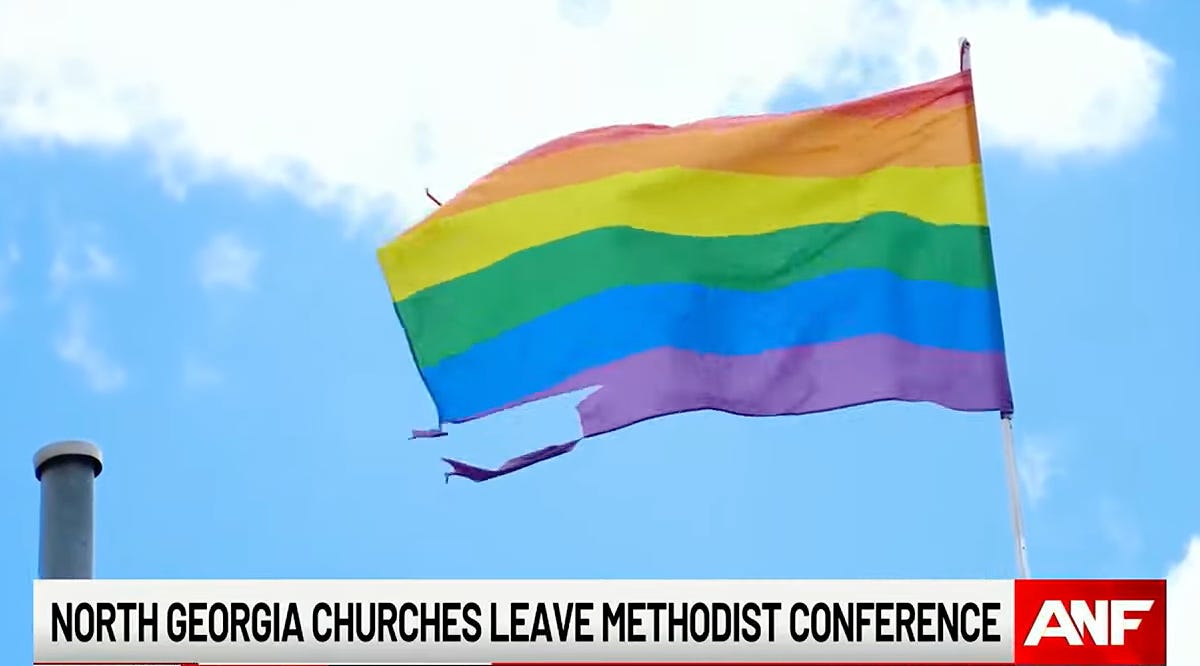More congregations are ditching the United Methodist Church over an LGBTQ schism
Another 261 churches, all from northern Georgia, are leaving the UMC
This newsletter is free, but it’s only able to sustain itself due to the support I receive from a small percentage of regular readers. Would you please consider becoming one of those supporters? You can use the button below to subscribe to Substack or use my usual Patreon page!
***NOTE***: Earlier today, I sent out a version of this article that misinterpreted the reason some of these churches were leaving. That should now be corrected. My apologies for the mistake on my end.
For years now, the United Methodist Church, the second-largest Protestant denomination in the United States with more than 12 million members, has considered splitting up over the question of whether or not to embrace bigotry.
It’s the right move. Some relationships need to end in divorce.
The entire controversy stems from the question of whether individual UMC churches should be allowed to ordain LGBTQ members as ministers and perform same-sex marriages. While the majority of UMC churches in the United States supported that kind of a la carte option, many in other parts of the world actively opposed that idea. In 2019, 53% of UMC delegates voted on a plan that basically rejected LGBTQ inclusion for everyone formally affiliated with the church. (They had until the end of 2023 to make a decision. The next General Conference isn’t slated to be held until 2024.)
That meant pro-inclusion churches were going to have to make a decision: Accept the new rules and say goodbye to LGBTQ leaders in relationships and those who wanted to perform same-sex unions—along with all those younger people who would never voluntarily join such a bigoted denomination—or make a break and try to run a church with no support from a larger body.
At the same time, after a number of relatively liberal churches said they wouldn’t enforce those rules, a bunch of conservative churches vowed to leave if the UMC didn’t enforce their ban.
Leaving the UMC comes with a massive financial hit: Churches that want to disaffiliate have to “pay two years' worth of church dues and fund their pension obligations.” And that’s not even considering the churches that rely on financial help from the UMC.
And yet, in Georgia, that’s exactly what 261 churches will be doing.

On Saturday, the UMC’s North Georgia Conference—a coalition of about 700 churches—agreed to part ways with the 261 churches. As the Guardian puts it, this is “interpreted as conservative congregations choosing to leave rather than debate or accept the views of more moderate factions within the church.”
CNN puts this in context:
In recent decades, several of the traditional mainline Protestant denominations have split up over homosexuality or related issues, including the American Baptist Churches USA, the Episcopal Church, the Evangelical Lutheran Church in America and the Presbyterian Church USA.
On Saturday, the requests of four of the Georgia congregations seeking to be disaffiliated were not ratified, “following discussion by the members of the Annual Conference,” according to a news release.
The exits of the 261 other churches will go into effect at the end of November.
…
Under the terms of the disaffiliation agreement, churches leaving the conference can no longer use the “United Methodist” name nor use the denomination’s logo. They also must fulfill financial obligations and are prohibited from pursuing further litigation against the conference, according to the news release.
All those churches are ditching the UMC, confident that the short-term financial losses and rebranding of their churches won’t hurt them too much in the long-term. Or, in some cases, they feel this issue is worth the cost of either defying the church’s bigotry or maintaining their hardline conservative positions.
This comes after 193 churches in the UMC South Georgia Conference left earlier this year, leaving only 274 churches in that conference.
Over the weekend, another 59 congregations in the United Methodist Church in Iowa were also given the green light to leave. (Another 83 left the same conference earlier this year.)
In fact, of the roughly 30,000 UMC churches across the country that existed in 2019, 7,286 of them have chosen to walk away since then, likely because of this controversy. (Side note: This spreadsheet is *incredible* to watch change over time.)
That means one of the largest Christian groups in the country is about to get even smaller—and, therefore, less powerful—all because of their stance on whether LGBTQ people deserve humanity. They didn’t go far enough in one direction, then they didn’t double down on that stance when it was challenged, and it’s possible that will all change again next year. Even if the UMC becomes pro-LGBTQ next year, that will only lead to more conservative congregations disaffiliating. It’s incredible that this issue, in 2023, is the hill on which UMC members have chosen to die.
There may be ripple effects from these separations, too. How many members of these progressive no-longer-UMC churches will soon split from organized Christianity entirely and come to grips with the notion that the world is better off without religion getting in the way? How many conservative no-longer-UMC churches will join the more openly anti-LGBTQ “Global Methodist Church”?
Whatever happens, the UMC’s failure to bring people together based on this subject says a lot about the institution and many of its members. While I could argue those disaffiliating anti-gay churches won’t be missed, that still means many progressive churches who remain in the UMC are currently supporting an organization that doesn’t believe in the humanity of LGBTQ people. It’s not a good look for them, either.
(Portions of this article were published earlier)


thoughts and prayers
Sad trumpet noises
Wah wah waaah.